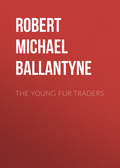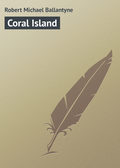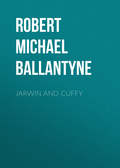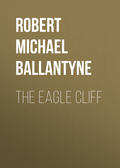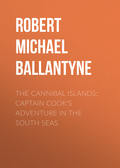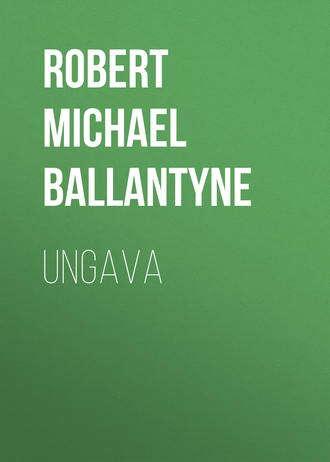
Robert Michael Ballantyne
Ungava
Chapter Eight.
Bryan’s adventure with a polar bear, etcetera
Ice, ice, ice! everything seemed to have been converted into ice when the day broke on the following morning and awoke the sleepers in the camp. A sharp frost during the night, accompanied by a fall of snow, had, as if by magic, converted spring into winter. Icy particles hung upon and covered, not only the young leaves and buds of the bushes, but the branches also, giving to them a white and extremely airy appearance. Snow lay on the upper sides of the canoes, and weighed heavily on the tent, causing its folds, once seemingly so pure and white, to look dirty by contrast. Snow lay on the protruding legs of the men, and encircled the black spot where rested the ashes of last night’s brilliant fire. Ice grated on the pebbles of the shore; ice floated on the sea; icy hummocks and mounds rose above its surface; and icebergs raised their pinnacles on the far-off horizon, and cut sharply into the bright blue sky.
It was cold, but it was not cheerless; for when Eda put out her head at the curtain doorway of the tent, and opened her eyes upon the magic scene, the sun’s edge rose above the horizon, as if to greet her, and sent a flood of light far and near through the spacious universe, converting the sea into glass, with islands of frosted silver on its bosom. It was a gorgeous scene, worthy of its great Creator, who in His mysterious working scatters gems of beauty oftentimes in places where there is scarce a single human eye to behold their excellence.
Although the sea was covered with ice, there were, nevertheless, several lanes of open water not far from the shore; so that when Stanley called a council, composed of Frank Morton, Dick Prince, and Massan, it was agreed unanimously that they should attempt to proceed. And it was well that they did so; for they had not advanced many miles, winding their way cautiously among the canals of open water, when they doubled a promontory, beyond which there was little or no ice to be seen, merely a few scattered fragments and fields, that served to enhance the beauty of the scene by the airy lightness of their appearance in contrast with the bright blue of the sea and sky, but did not interrupt the progress of the travellers. The three canoes always maintained their relative positions during the journey as much as possible. That is to say, Frank and the two Indians went first in the small canoe, to lead the way, while the two large canoes kept abreast of each other when the open water was wide enough to permit of their doing so. This, besides being more sociable, enabled the two crews to join in the chorus of those beautiful songs with which they frequently enlivened the voyage.
During all this day, and for many days following, they continued to enjoy fine weather and to make rapid progress. Sometimes the ice was pretty thick, and once or twice they narrowly escaped being nipped by collapsing masses, which caused them to jump out, hastily throw the baggage on the ice, and haul the canoes out of the water. On these occasions the men proved themselves to be sterling fellows, nearly all of them being cool, prompt, and collected in the moment of danger. No doubt there were exceptions. La Roche, when any sudden crisis of danger arose, usually threw himself blindly over the side of the canoe on to the ice with the lightness and agility of a harlequin. He recked not whether he came down on his head or his feet, and more than once nearly broke his neck in consequence of his precipitancy. But La Roche was no coward, and the instant the first burst of excitement was over he rushed to render effective assistance. Bryan, too, although not so mercurial as La Roche, was apt to lose self-command for about five minutes when any sudden danger assailed him, so that he frequently sat still, staring wildly straight before him, while the others were actively unloading the canoes; and once, when the danger was more critical than usual, having sat till the canoe was empty, and paid no attention to a prompt, gruff order to jump ashore, he had been seized by the strong arms of Gaspard and tossed out of the canoe like a puppy dog. On these occasions he invariably endeavoured to make up for his fault by displaying, on recovery, the most outrageous and daring amount of unnecessary recklessness,—uttering, at the same time, an amazing number of strange expressions, among which “Tare an’ ages!” “Och! murder!” and several others less lucid in signification, predominated. Chimo was always first ashore, and instantly wheeled round to greet Eda, who was also always second, thanks to the strong and prompt arm of François, who sat just in front, and by tacit agreement took her under his special charge. As for Mrs Stanley, the arm that was rightfully her own, and had been her shield in many a scene of danger, proved ever ready and able to succour the “first volunteer” to Ungava.
At times the sea was quite free of ice, and many miles were soon added to the space which separated the little band of adventurers from the rest of the human world. Their encampments varied according to the nature of the coast, being sometimes among pine-trees, or surrounded by dwarf willows; at other times on the bare sand of the sea-shore; and occasionally at the extremity of long-projecting capes and promontories, where they had to pitch their tent and make their beds in the clefts of the solid rock. But wherever they laid them down to rest—on the rock, or on the sand, or within the shade of the forest—it was always found, as Mrs Stanley remarked of the first night’s encampment, that they were extremely comfortable and eminently snug.
They were successful, too, in procuring an ample supply of fresh provisions. There were ducks and geese of various kinds, and innumerable quantities of plover, cormorants, gulls, and eider-ducks, the eggs of which they found in thousands. Many of these birds were good for food, and the eggs of most of them, especially those of the eider-duck, were excellent. Reindeer were also met with; and, among other trophies of his skill as a hunter, Frank one day brought in a black bear, parts of which were eaten with great gusto by the Esquimaux and Indians, to the immense disgust of Bryan, who expressed his belief that the “haythens was barely fit to live,” and were most justly locked out from society in “thim dissolate polar raygeons.” There were many seals, also, in the sea, which put up their ugly, grotesque heads ever and anon, gazed at the canoes with their huge, fishy eyes, as in surprise at the sight of such novel marine monsters, and then sank slowly beneath the wave. These animals were never molested, out of respect to the feelings of the two Indians, who believed them to be gods, and assured Stanley that the destruction of one would infallibly bring down ill-luck and disaster on the heads of the party. Stanley smiled inwardly at this, but gave orders that no seals should be shot—an order which all were very willing to obey, as they did not require the animals either for food or any other purpose. Several white polar bears were seen, but they also were spared, as they require a great deal of shot to kill them, if not hit exactly behind the ear; and besides, neither their bodies nor skins were of any use to the travellers.
Thus all went favourably for a time. But life is a chequered story, and the sun of prosperity does not always shine, as we shall see.
One fine morning, as they were paddling cheerfully along in the neighbourhood of Cape Jones, it struck Mr Stanley that he might prove the correctness of his sextant and other instruments before entering upon the country which to most of the party was terra incognita. This was the more necessary that he could not depend on the guidance of Oostesimow and Ma-Istequan, they having travelled only once, long ago, through part of the country, while the latter part of it was totally unknown to them. It was one of those beautiful mornings that are peculiar to arctic regions, when the air is inexpressibly still, and all inanimate nature seems hushed in profound repose—a repose which is rather rendered more effective than otherwise by the plaintive cries of wild-fowl or the occasional puffing of a whale. There was a peculiar brilliancy, too, in the atmosphere, caused by the presence of so many fields and hummocks of white ice, looming fantastically through a thin, dry, gauze-like haze, which, while it did not dim the brightness of the solar rays, lent an additional charm to every object by shrouding it in a veil of mystery.
On passing the point the men ceased rowing, and proceeded to solace themselves with a five-minutes’ pipe—an indulgence which voyageurs always claim as their due after a long spell at the oars or paddles.
“Put ashore here, Massan,” said Stanley, turning to the guide; “I shall take an observation, if possible, and you can set the men to hunt for eggs. We shall want them, as the larder is rather low just now.”
Massan muttered assent, and, shouting to the other canoe to put ashore, ran alongside the rocks.
“You’d better hail the little canoe,” said Stanley, as he landed. “I shall want Mr Morton to assist me.”
Massan stepped upon an elevated rock, and, shading his eyes with his hands, looked earnestly ahead where he observed the little canoe almost beyond vision, and just going to double a point of land. Transferring his hands to his mouth, he used them as a trumpet, and gave forth a shout the like of which had never startled the echoes of the place before.
“It’s no use, sir,” said Massan; “he’s past hearin’. I’m afeerd that they’re off in the direction o’ the White Bear Hills, in hopes o’ gittin’ a shot.”
“Try again, Massan,” urged Stanley; “raise your pipe a little higher. Perhaps it will reach them.”
Massan shook his head. “Try it, Bryan,” he said, turning to the Irishman, who was sitting on a rock leisurely filling his short, black pipe.
“Is it to halloo ye want me?” replied Bryan, rising. “Shure the great gun of Athlone itself could niver hold a candle to ye, Massan, at yellin’; but I’ll try, anyhow;” and putting his hands to his mouth he gave forth a roar compared to which Massan’s was nothing. There was a sort of crack in the tone of it, however, that was so irresistibly ridiculous that the whole party burst incontinently into a fit of laughter. Loud though it was, it failed to reach the ears of those in the little canoe, which in a few seconds doubled the point and disappeared.
“Ah, bad luck to it!” said Bryan, in disgust; “the pipe’s damaged intirely. Small pace to ye, Bob Mahone; for shure it was howlin’ and screechin’ at your wake like a born scrandighowl that broke it.”
“Never mind, lad; what remains of it is not bad,” said Stanley, laughing, as he proceeded to open the box containing his scientific instruments.
Meanwhile his wife and Edith wandered along the rocks picking up shells and pebbles; and the men dispersed, some to smoke and chat, others to search for eggs. Bryan and La Roche, who were both aspiring geniuses, and had formed a sort of rough attachment to each other, asked permission to take a walk to the point ahead, where they would wait for the canoes. Having obtained it, they set off at a good round pace, that would have been “throublesome to kape up,” as Bryan remarked, “with payse in yer shoes!”
“Why you come for to jine de company?” inquired La Roche, as they jogged along.
“Why? bekase I’d nothin’ else to do, as the ould song says. Ye see, Losh,” (Bryan had invented a contraction for his friend’s name, which he said was “convanient”)—“ye see, Losh, there may be more nor wan raison for a gintleman lavin’ his native land in order to thravel in furrin parts. It’s thrue I had nothin’ in the univarse to do, for I could niver git work nohow, an’ whin I got it I could niver kape it. I niver could onderstan’ why, but so it was. Nivertheless I managed to live well enough in the ould cabin wid the murphies—”
“Vat is murphies?” inquired La Roche.
“Bliss yer innocent face, don’t ye know it’s praties?”
“’Tis vat?”
“Praties, boy, or pit-taties, if I must be partic’lar.”
“Ah! goot, goot, I understan’—pettitoes. Oui, oui, ye call him pomme de terre.”
“Hum! well, as I was sayin’, I got on pretty well wid the pumdeterres an’ the pig, but the pig died wan day—choked hisself on a murphy—that is, a pumbleterre; an’ more betoken, it was the last murphy in the house, a powerful big wan that my grandmother had put by for supper. After this ivery thin’ wint to smithereens. The rot came, and I thought I should have to list for a sodger. Well, Bob Mahone died o’ dhrink and starvation, an’ we had a beautiful wake; but there was a rig’lar shindy got up, an’ two or three o’ the county p’lice misbehaved themselves, so I jist floored them all, wan after the other, an’ bolted. Well, I wint straight to Dublin, an’ there I met wid an ould friend who was the skipper o’ a ship bound for New York. Says he, ‘Bryan, will ye go?’ Says I, ‘Av coorse; ’an ’shure enough I wint, an’ got over the say to ’Meriky.’ But I could niver settle down, so, wan way or another, I came at last to Montreal and jined the Company; an’ afther knockin’ about in the Columbia and Mackenzie’s River for some years, I was sint to Moose, an’ here I am, Losh, yer sarvant to command.”
“Goot, ver’ goot, mais peculiaire,” said La Roche, whose intimacy with this son of Erin had enabled him to comprehend enough of his jargon to grasp the general scope of his discourse.
“Av ye mane that lavin’ the ould country was goot,” said Bryan, stooping to pick up a stone and skim it along the smooth surface of the sea, “p’raps ye’re right; but there’s wan thing I niver could make my mind aisy about,” and the blacksmith’s voice became deep and his face grave as he recalled these bygone days.
“Vat were dat?” inquired La Roche.
“Why, ye see, Losh, I was so hard druve by the p’lice that I was forced to lave wid-out sayin’ good day to my ould mother, an’ they tould me it almost broke her heart; but I’ve had wan or two screeds from the priest wid her cross at them since, and she’s got over it, an’ lookin’ out for my returnin’—bliss her sowl!—an’ I’ve sint her five pounds ivery year since I left: so ye see, Losh, I’ve great hope o’ seein’ her yit, for although she’s ould she’s oncommon tough, an’ having come o’ a long-winded stock, I’ve great hopes o’ her.”
Poor Bryan! it never entered into his reckless brain to think that, considering the life of almost constant peril he led in the land of his pilgrimage, there was more hope of the longevity of his old mother than of himself. Like many of his countrymen, he was a man of strong, passionate, warm feelings, and remarkably unselfish.
“Is your contry resemblance to dat?” inquired La Roche, pointing, as he spoke, towards the sea, which was covered with fields and mountains of ice as far out as the eye could discern.
“Be the nose o’ my great-grandmother (an’ that was be no manes a short wan), no!” replied Bryan, with a laugh. “The say that surrounds ould Ireland is niver covered with sich sugar-plums as these. But what have we here?”
As he spoke they reached the point at which they were to await the coming up of the canoes, and the object which called forth Bryan’s remark was the little canoe, which lay empty on the beach just beyond the point. From the manner in which it lay it was evident that Frank and his Indians had placed it there; but there was no sign of their presence save one or two footprints on the sand. While La Roche was examining these, his companion walked towards a point of rock that jutted out from the cliffs and intercepted the view beyond. On turning round this, he became suddenly rooted to the spot with horror. And little wonder, for just two yards before him stood an enormous polar bear, whose career was suddenly arrested by Bryan’s unexpected appearance. It is difficult to say whether the man or the beast expressed most surprise at the rencounter. They both stood stock still, and opened their eyes to the utmost width. But the poor Irishman was evidently petrified by the apparition. He turned deadly pale, and his hands hung idly by his sides; while the bear, recovering from his surprise, rose on his hind legs and walked up to him—a sure sign that he was quite undaunted, and had made up his mind to give battle. As for La Roche, the instant he cast his eyes on the ferocious-looking quadruped, he uttered a frightful yell, bounded towards a neighbouring tree, and ceased not to ascend until its topmost branches were bending beneath his weight. Meanwhile the bear walked up to Bryan, but not meeting with the anticipated grapple of an enemy, and feeling somewhat uneasy under the cataleptic stare of the poor man’s eyes—for he still stood petrified with horror—it walked slowly round him, putting its cold nose on his cheek, as if to tempt him to move. But the five minutes of bewilderment that always preceded Bryan’s recovery from a sudden fright had not yet expired. He still remained perfectly motionless, so that the bear, disdaining, apparently, to attack an unresisting foe, dropped on his forelegs again. It is difficult to say whether there is any truth in the well-known opinion that the calm, steady gaze of a human eye can quell any animal. Doubtless there are many stories, more or less authentic, corroborative of the fact; but whether this be true or not, we are ready to vouch for the truth of this fact—namely, that under the influence of the blacksmith’s gaze, or his silence it may be, the bear was absolutely discomfited. It retreated a step or two, and walked slowly away, looking over its shoulder now and then as it went, as if it half anticipated an onslaught in the rear.
We have already said that Bryan was no craven, and that when his faculties were collected he usually displayed a good deal of reckless valour on occasions of danger. Accordingly, no sooner did he see his shaggy adversary in full retreat, than the truant blood returned to his face with a degree of violence that caused it to blaze with fiery red, and swelled the large veins of his neck and forehead almost to bursting. Uttering a truly Irish halloo, he bounded forward like a tiger, tore the cap off his head and flung it violently before him, drew the axe which always hung at his belt, and in another moment stood face to face with the white monster, which had instantly accepted the challenge, and rose on its hind legs to receive him. Raising the axe with both hands, the man aimed a blow at the bear’s head; but with a rapid movement of its paw it turned the weapon aside and dashed it into the air. Another such blow, and the reckless blacksmith’s career would have been brought to an abrupt conclusion, when the crack of a rifle was heard. Its echo reverberated along the cliffs and floated over the calm water as the polar bear fell dead at Bryan’s feet.
“Hurrah!” shouted Frank Morton, as he sprang from the bushes, knife in hand, ready to finish the work which his rifle had so well begun. But it needed not. Frank had hit the exact spot behind the ear which renders a second ball unnecessary—the bear was already quite dead.
Chapter Nine.
A storm brewing—It bursts, and produces consequences—The party take to the water per force—All saved
“Ah, Bryan! ‘a friend in need is a friend indeed,’” said Frank, as he sat on a rock watching the blacksmith and his two Indians while they performed the operation of skinning the bear, whose timely destruction has been related in the last chapter. “I must say I never saw a man stand his ground so well, with a brute like that stealing kisses from his cheek. Were they sweet, Bryan? Did they remind you of the fair maid of Derry, hey?”
“Ah! thrue for ye,” replied the blacksmith, as he stepped to a rock for the purpose of whetting his knife; “yer honour was just in time to save me a power o’ throuble. Bad skran to the baste! it would have taken three or four rounds at laste to have finished him nately off, for there’s no end o’ fat on his ribs that would have kep’ the knife from goin’ far in.”
Frank laughed at this free-and-easy way of looking at it. “So you think you would have killed him, do you, if I had not saved you the trouble?”
“Av coorse I do. Shure a man is better than a baste any day; and besides, had I not a frind at my back ridy to help me?” Bryan cast a comical leer at La Roche as he said this, and the poor Frenchman blushed, for he felt that his conduct in the affair had not been very praiseworthy. It is due to La Roche to say, however, that no sooner had he found himself at the top of the tree, and had a moment to reflect, than he slid rapidly to the bottom again, and ran to the assistance of his friend, not, however, in time to render such assistance available, as he came up just at the moment the bear fell.
In half an hour afterwards the two large canoes came up, and Bryan and his little friend had to undergo a rapid fire of witticism from their surprised and highly-amused comrades. Even Moses was stirred up to say that “Bryan, him do pratty well; he most good ’nuff to make an Eskimo!”
Having embarked the skin of the bear, the canoes once more resumed their usual order and continued on their way. The carcass of the bear being useless for food, was left for the wolves; and the claws, which were nearly as large as a man’s finger, were given by Frank to the blacksmith, that he might make them into a necklace, as the Indians do, and keep it in remembrance of his rencounter.
But the weather was now beginning to change. Dick Prince, whose black eye was ever roving about observantly, told Massan that a storm was brewing, and that the sooner he put ashore in a convenient spot the better. But Stanley was anxious to get on, having a long journey before him, at the termination of which there would be little enough time to erect a sufficient protection against the winter of the north; so he continued to advance along shore until they came to a point beyond which there was a very deep bay that would take them many hours to coast. By making a traverse, however, in a direct line to the next point, they might cross it in a much shorter time.
“How say you, Prince? shall we cross?” asked Stanley, as they rested on their paddles and cast furtive glances up at the dark clouds and across the still quiet bay.
Prince shook his head. “I fear we won’t have time to cross. The clouds are driving too fast and growin’ black.”
“Well, then, we had better encamp,” said Stanley.—“Is there a proper place, Massan, hereabouts?”
“No, sir,” replied the guide. “The stones on the beach are the only pillows within six mile o’ us.”
“Ho! then, forward, boys, make a bold push for it,” cried Stanley; “if it does begin to blow before we’re over, we can run back again at all events.”
In another moment the canoes swept out to sea, and made for the point far ahead like race-horses. Although the clouds continued to gather, the wind did not rise, and it seemed as though they would get over easily, when a sudden gust came off the shore—a direction whence, from the appearance of the clouds, it had not been expected. Ruffling the surface of the water for a few seconds, it passed away.
“Give way, boys, give way,” cried Massan, using his large steering paddle with a degree of energy that sent the canoe plunging forward. “We can’t go back, an’ if the storm bursts off the shore—”
A loud peal of thunder drowned the remainder of the sentence, and in a few seconds the wind that had been dreaded came whistling violently off the shore and covered the sea with foam. The waves soon began to rise, and ere long the frail barks, which were ill calculated to weather a storm, were careering over them and shipping water at every plunge.
It now became a matter of life and death with them that they should gain the point, for, deeply loaded as they were, it was impossible that they could float long in such a sea. It is true that a wind off the shore does not usually raise what sailors would consider much of a sea; but it must be remembered that, although it was off shore, the bay which they were crossing extended far inland, so that the gale had a wide sweep of water to act upon before it reached them. Besides this, as has already been explained, canoes are not like boats. Their timbers are weak, the bark of which they are made is thin, the gum which makes their seams tight is easily knocked off in cold water, and, in short, they cannot face a sea on which a boat might ride like a sea-gull.
For a considerable time the men strained every nerve to gain the wished-for point of land, but with so little success that it became evident they would never reach it. The men began to show signs of flagging, and cast uneasy glances towards Stanley, as if they had lost all hope of accomplishing their object, and waited for him to suggest what they should do. Poor Mrs Stanley sat holding on to the gunwale with one hand and clasping Edith round the waist with the other, as she gazed wistfully towards the cape ahead, which was now almost lost to view under the shadow of a dark cloud that rolled towards them like a black pall laden with destruction.
“God help us!” murmured Stanley, in an undertone, as he scanned the seaward horizon, which was covered with leaden clouds and streaks of lurid light, beneath which the foaming sea leaped furiously.
“Call upon Me in the time of trouble, and I will deliver thee,” said Mrs Stanley, who overheard the exclamation.
Stanley either heard her not or his mind was too deeply concentrated on the critical nature of their position to make any reply. As she buried her face in her hands, Edith threw her trembling arms round her mother and hid her face in her bosom. Even Chimo seemed to understand their danger, for he crept closer to the side of his young mistress and whined in a low tone, as if in sympathy. The waves had now increased to such a degree that it required two of the men to bail incessantly in order to prevent their being swamped, and as Stanley cast a hurried glance at the other canoes, which were not far off, he observed that it was as much as they could do to keep afloat. “Could we not run back, Massan?” asked Stanley, in despair.
“Unposs’ble, sir,” replied the guide, whose voice was almost drowned by the whistling of the wind. “We’re more nor half-way over, an’ it would only blow us farther out to sea if we was to try.”
While the guide spoke, Stanley was gazing earnestly in the direction of the horizon.
“Round with you, Massan,” he exclaimed suddenly; “put the canoe about and paddle straight out to sea.—Hallo!” he shouted to the other canoes, “follow us out to sea—straight out.”
The men looked aghast at this extraordinary order. “Look alive, lads,” continued their leader; “I see an island away there to leeward. Perhaps it’s only a rock, but any way it’s our only chance.”
The canoes’ heads were turned round, and in another moment they were driving swiftly before the wind in the direction of the open sea.
“Right, right,” murmured Dick Prince, as they made towards this new source of hope; “mayhap it’s only a bit o’ ice, but even that’s better than nothin’.”
“If ’tis only ice,” cried La Roche, “ye have ver’ pauvre chance at all.”
“Shure, an’ if we are to go ashore at all, at all,” said Bryan, whose spirits had suddenly risen with this gleam of hope from fifty degrees below to fifty above zero—“if we are to go ashore at all, at all, it’s better to land on the ice than on the wather.”
With such a breeze urging them on, the three canoes soon approached what appeared to be a low sand-bank, on which the sea was dashing in white foam. But from the tossing of the waves between them and the beach, it was difficult to form a conjecture as to its size. Indeed, at times they could scarcely see it at all, owing to the darkness of the day and the heavy rain which began to fall just as they approached; and more than once Stanley’s heart sank when he lost sight of the bank, and he began to think that he had made a mistake, and that they were actually flying out to the deep sea, in which case all hope would be gone for ever. But God’s mercy was extended to them in this hour of peril. The island appeared to grow larger as they neared it, and at last they were within a stone’s-throw of the shore. But a new danger assailed them here. The largest canoe, which neared the island first, had begun to leak, and took in water so fast that the utmost efforts of those who bailed could not keep it under, and from the quantity that was now shipped they made very little way. To add to the horror of the scene, the sky became very dark, and another crash of thunder pealed forth accompanied by a blinding flash of lightning.
“Paddle, boys, paddle for your lives!” cried Stanley, throwing off his coat, and seizing a tin dish, with which he began to throw out the water.
The canoe rose on a huge wave which broke all round it. This nearly filled it with water, and carried it towards the shore with such velocity that it seemed as if they should be dashed in pieces; but they fell back into the trough of the sea, and lay motionless like a heavy log, and in a sinking condition.
“Now, lads, look out for the next wave, and give way with a will,” cried Massan. The worthy steersman acted rather too energetically on his own advice, for he dipped his paddle with such force that it snapped in two.
“Be ready to jump out,” cried Dick Prince, standing up in the bow in order to give more power to his strokes.
As he spoke, Stanley turned to his wife, and said, “Jessie, hold on by my collar; I’ll take Eda in my arms.” At that instant the canoe gave a lurch, and before Stanley could grasp his child, they were all struggling in the sea! At this awful moment, instead of endeavouring to do as her husband directed, Mrs Stanley instinctively threw her arms around Edith, and while the waves were boiling over her, she clasped the child tightly to her bosom with her left arm, while with her right she endeavoured to raise herself to the surface. Twice she succeeded, and twice she sank, when a box of merchandise providentially struck her arm. Seizing this, she raised herself above the water, and poor Edith gasped convulsively once or twice for air. Then the box was wrenched from her grasp by a wave, and with a wild shriek she sank again. Just then a strong arm was thrown around her, her feet touched the ground, and in a few seconds she was dragged violently from the roaring waves and fell exhausted on the beach.



